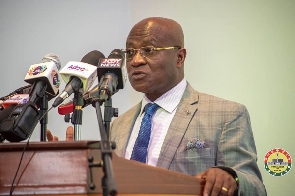When vans equipped with loudspeakers arrived in the South African mining town of Thlabane to urge residents to get screened for the coronavirus, restaurant worker Thembelihle didn’t hesitate to join the queue.
“We’re very afraid from what we are seeing on TV,” the 34-year-old said after she completed her screening. “The numbers are going up.”
South Africa this month became the first African country to roll out a nationwide screening and testing program to determine whether the disease has taken a foothold outside the affluent areas where it was first detected. Despite a stringent lockdown that appears to have brought the rate of infections under control, the government has reason to be concerned.
In blue-collar towns like Thlabane, which is on the outskirts of Rustenburg, there’s limited space to practice social distancing, and the virus could spread far faster than it has in the well-heeled suburbs of Johannesburg and Cape Town.
“We don’t want to follow, we want to lead,” said Karmani Chetty, chief executive officer of the National Health Laboratory Services. “We were aware that South Korea, China and Singapore were very aggressive in their testing strategies. So this was a way we believed we could do it.”
Tests Doubled
With the world’s highest number of HIV infections -- almost 8 million people out of a population of 59 million -- the country is banking on decades of experience in fighting communicable diseases. The government has deployed 67 mobile screening and testing vans along with 10,000 field workers in a bid to boost testing tenfold to 30,000 a day by the end of April. Half of the staff have been seconded from the U.S. President’s Emergency Plan for AIDS Relief, which has operated in South Africa for 17 years.
In Gauteng, the province that includes Johannesburg and accounts for about 40% of all known infections, about 27,000 people had been screened by April 9, according to provincial health authorities. Nationwide, the number of tests per day doubled between April 5 and April 8 to around 6,000, health department figures show.
“Internal transmission has started and it may spread silently,” Zweli Mkhize, South Africa’s health minister, told reporters last week. “We may have a runway train with no way of applying the brakes.”
Initially, people will be screened for signs of infection, with samples taken and transported to a network of laboratories. Later, many of the vans will be kitted out with GeneXpert machines made by U.S.-based Cepheid and test results will be given on-site within 45 minutes. South Korean equipment may be brought in at a later stage.
Entire Households
Still, as countries worldwide scramble to procure medical and protective equipment, South Africa, which has just over 2,000 confirmed infections, isn’t high on the priority list, said Glenda Gray, president of the South African Medical Research Council.
“One has to be cautious; even well-resourced countries struggle to contain this epidemic,” she said. “You can run your race fast if you have the shoes and the right track. We have to note the things that hamper us -- the lack of personal protective equipment and tests.”
While South Africa’s program is the biggest on the continent, other countries such as Ghana and Cameroon are undertaking similar programs.
In Ghana, medical staff go from residence to residence in ‘hotspots,’ or areas with known infections, to test entire households if one member shows symptoms. The number of cases reached 378 on Thursday after the government tested 14,000 samples. It’s waiting for the outcome of a further 10,000 tests over the next week after taking a total of 37,405 samples.
Cameroon has deployed 1,200 medical workers in the commercial hub of Douala, the start of a nationwide door-to-door screening program. Ivory Coast plans to set up 45 testing centers nationwide.
While the outbreaks in most African countries are still relatively muted, screening is seen as the fastest way of containing localized outbreaks and an aggressive step forward from the current practice, which has focused on testing recent travelers with symptoms. The social makeup of South Africa and other African nations, which have a large proportion of people living in poverty and with little access to health care, has prompted many governments to take a proactive approach to the pandemic.
“I don’t think South Korea has a place that looks like Alexandra, Diepsloot or Zandspruit,” said Bandile Masuku, head of health in the provincial government of Gauteng, referring to three Johannesburg shantytowns.
Making the program succeed is essential, said Chetty of the National Health Laboratory Services.
“We have to contain it for the sake of the country,” she said. “I really do believe that this will be one of the success stories.”
Africa News of Monday, 13 April 2020
Source: Bloomberg
Bloomberg Health: Screening key to halting ‘runaway train’ of Africa infection
 South Africa became the first African country to roll out a nationwide screening and testing program
South Africa became the first African country to roll out a nationwide screening and testing program
















